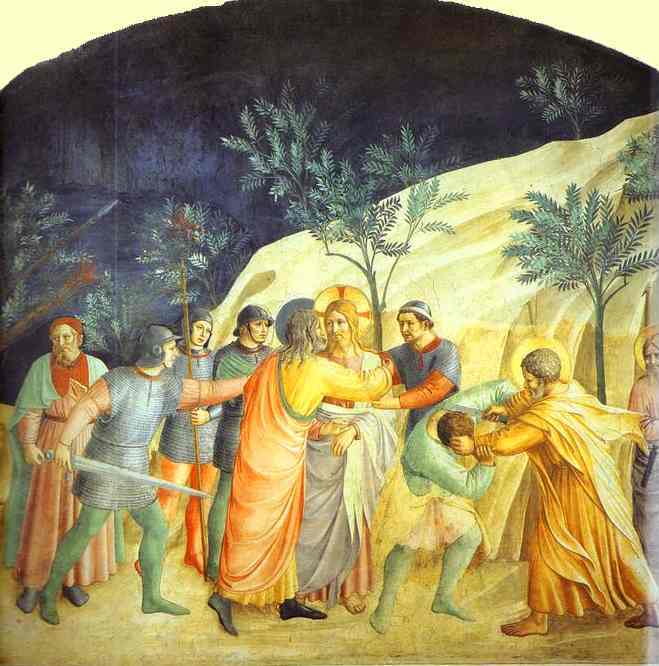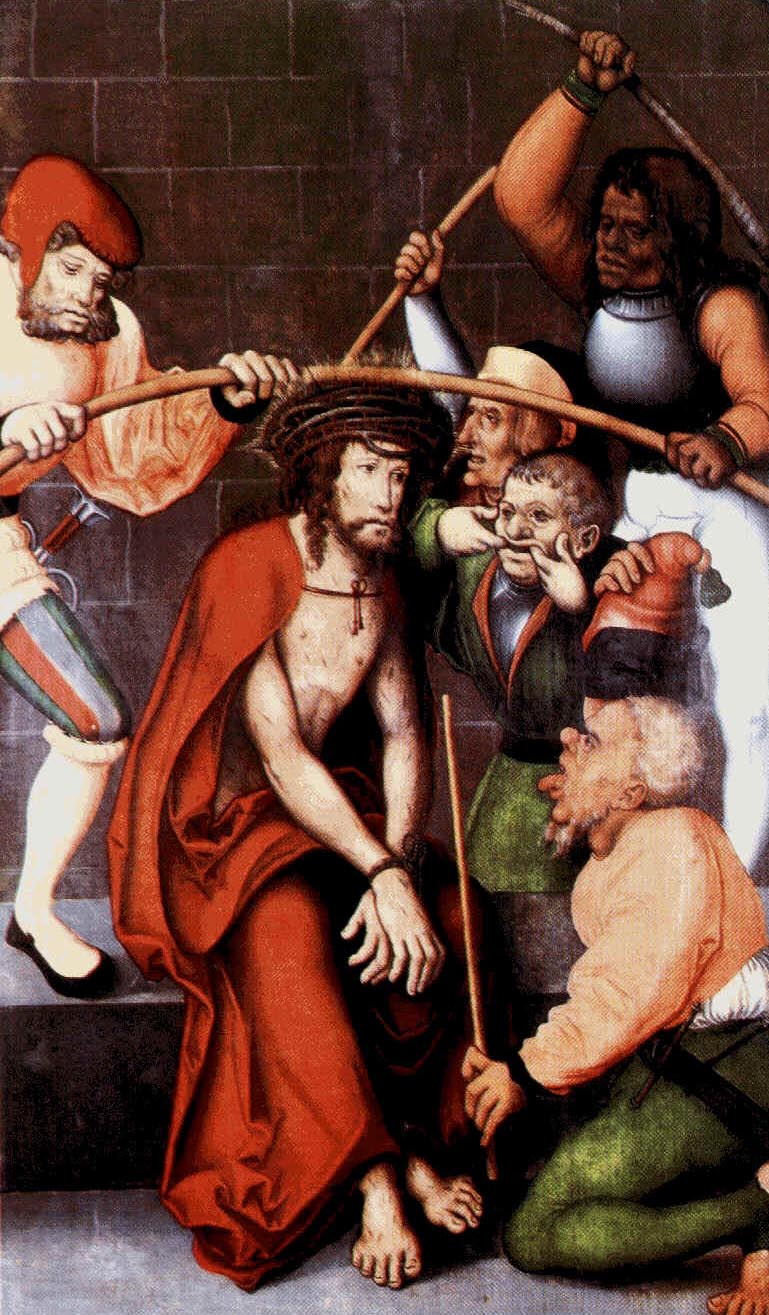
The following is a commentary by Dr. Plinio
The concept of Our Lady of Sorrows comes from the prophecy of Simeon who, thirty-three years in advance, foretold to Our Lady that a sword would pierce her heart. This prophecy proves that we can suffer spiritual reversals even when we live a glorious life. Given the existence of sin, life is full of expiation and struggle.
The Presentation begins with the prophet Simeon taking the Child Jesus in his arms and prophesizing: "Now Thou dost dismiss thy servant, O Lord, according to Thy word in peace; because my eyes have seen Thy salvation which Thou hast prepared before the face of all peoples: A light to the revelation of the Gentiles, and the glory of Thy people Israel." Hearing that prophecy, Our Lady became even more aware of the immense glory of the Divine Child.
After blessing Our Lady, Simeon then said: "Behold this Child is set for the fall, and for the resurrection of many in Israel, and for a sign which shall be contradicted." Thus, after predicting a magnificent future, he announced a life of terrible struggle. Then, turning to her, he said: "And thy own soul a sword shall pierce, that, out of many hearts, thoughts may be revealed."
He thus announced to Our Lady not only the terrible struggle Our Lord would face but also that a sword would pierce her soul. In other words, she knew in advance that she would have to endure one of the most atrocious sufferings a person could bear.
Lessons for Modern Man
This sequence of events has valuable lessons for modern man. It is evident that God wanted the Christ Child to be the victorious king mentioned in Simeon’s prophecy, yet modern man finds it difficult to explain logically how a wise and consistent God would put Him through all those struggles that would end up in defeat.
Modern man reasons that it would be according to the natural order of things established by God’s wisdom not to allow this suffering and defeat. Why should there be the mystery of this terrible moment announcing this sword that would pierce Our Lady’s Heart? How can we understand God allowing such great suffering and apparent defeat?
The reason for this perplexity comes from a modern mentality that does not know how to deal with the setbacks of the spiritual life and apostolate. Many people simply do not understand why they should be tempted when they are doing well in their spiritual life. Why does Our Lady allow us to sin and displease her? It appears to be a contradiction. If the objective of sanctity is clear, then it would seem normal for everything to move orderly and consistently toward that end? How do we explain the setbacks?
"Happy End" Mindset
Here we see a reflection of the "happy end" mentality found in Hollywood films where things always end up right. According to this erroneous mindset, we must harbor the certainty that everything must have a happy ending, for man is called to be happy and victorious on this earth. When things do not end up well, then we have the sensation that life is a failure.
This "happy end" mentality intoxicates our minds so that we are unable to understand how God’s plans are accomplished. Given the existence of sin, the fall of the angels and the fall of man, human life has a character not only of trial, but also of expiation and struggle. Divine Providence acts with wisdom, when allowing the good to have setbacks, sicknesses, temptations, or fights with adversaries. Providence also allows all these things to befall us in situations in which we do not understand why they are happening to us. Suffering is normal in this life. It is normal that many things yield bad results and even turn out wrong or at least, different than intended.
However, for His greater glory, God draws from bad results, something better and more brilliant than we could imagine even if we had good results. These unexpected sufferings and trials are not only something that sinful man must suffer, they also correspond to a punishment for the sins we may have committed. They are a proof of our love to God since we must lovingly render to Him, blind confidence, detachment and abnegation. This is highly formative for men. However it only has value to the degree that we accept these sufferings with a supernatural spirit rather than complaining about them. We must accept these trials as a soldier who moves forward in the fight.
The Mystery of Simeon’s Prophecy
Here one understands the mystery of Simeon’s prophecy. According to the modern mindset, it would have been better not to advise Our Lady of her sorrow thirty-three years in advance. It would have been better to circumvent the issue and keep quiet about it. Even at the hour Our Lord was to be crucified, she should be spared that terrible sorrow by avoiding it altogether.
However, Our Lady carried the knowledge of this sorrow her whole life. She saw it coming from afar. Thus, her immaculate soul, conceived without Original Sin, gradually grew in perfection and sanctity by the long consideration and acceptance of the sorrow that was to come.
Even for Our Lady’s immaculate soul, we can understand that a strong, courageous, reasonable and, we could even say, manly calculation of future sorrows would be an element of growing union with God. From the very first instant of her being, Our Lady’s very intense union with God was unfathomable. However, she was intentionally given to carry her sorrow for thirty three years with the understanding that we were born to suffer. It is normal for us to suffer and it is necessary to accept pain entirely before it comes. And when suffering does come, it should find us calm, faithful, dauntless and heroic, for this is how we must be in the face of pain and sorrow.
The Garden of Olives
Thus, we can find an analogy between the life of Our Lord and Our Lady. She spent thirty-three years of her life in the Garden of Olives. She foresaw all the sorrow amidst indescribable joys. She saw her Divine Son grow and prepare for His public life. She could see that piercing sword of sorrow awaiting her as she saw Him leave home, heard the rumors being spread about Him, and noticed the growing hatred against Him from all sides. The forces of evil were preparing the most atrocious coup against her Son, and she, who adored Him as her God and Son, sensing the horrible sin being prepared, accepted the trial of facing up to the coming events.
The end result of this preparation was that she was ready for the most magnificent hour of her life. While all men deserted Our Crucified Lord, Our Lady stood at the foot of the Cross. In spite of the terrible suffering, at no moment was she disoriented. She did not lose her self- control or wish to flee. All these vile passions would be unbefitting for her, filled as she was with the most excellent virtues elevated to the highest degree. No one had ever suffered so much while maintaining such complete self-control and understanding of the logic of what was happening. Our Lady did this with so much strength and poise, and hatred of evil. We can even sense her hatred for evil in that she knew that evil would be entirely crushed at the moment that her Divine Son expired.
While all men deserted
Our Crucified Lord,
Our Lady stood at the foot of the Cross.
A Hatred of Evil
During the whole time of the Passion, she took the following attitude: I adore my Son, but if it be necessary to sacrifice Him to crush the devil, defeat the power of darkness and annihilate the Revolution, I consent to His death. I immolate Him for this end, so to speak. This sword I plunge into my own heart, so that the devil and his Revolution be crushed forever. I unite myself with the most holy intentions of the Father and Holy Ghost to make this frightful sacrifice. With this in mind, I want what is happening on the Cross and I want it at every instant with all the intensity of my being.
If this does not define a combative and fighting spirit and disposition to crush the enemy, then nothing can define it. This stance was a consequence of her preparation during those thirty-three years.
Analogy with Our Lord
What does this have in common with the life of Our Lord and the Garden of Olives? Our Lord meditated and saw everything that would befall Him in the Garden of Olives. He then began to feel horror and terror at what was going to happen and prayed: "Father, if thou wilt, remove this chalice from me, but yet not my will, but Thine be done."
In saying this, He affirmed that He wanted all this suffering in order to attain a certain result. This shows supreme control, supreme calm, and supreme generosity. It indicates what the temperament of a Catholic must be when facing suffering and the love that we must have for suffering. To fulfill our vocation, we must understand this well and practice it.
Our Sword of Sorrow
This teaches us to be imbued with the following idea: It is normal in our tremendous fight that there will be many moments when a sword of sorrow will pierce our souls.
As has happened in the past, we may appear defeated, disoriented and abandoned by Providence. However we must recite the psalm Our Lord prayed on the Cross: My God, my God, why hast Thou forsaken me? We have to place ourselves before this perspective because these things will happen since our fight is not always a victory parade.
We should ask Our Lady to obtain for us the grace to love and desire this sword of sorrow and start preparing our life immediately for that hour. For just as the finest hour in Our Lady’s life was that of the sword and fidelity, together with the Incarnation, so we can also say that the great hour of our life was not the one when we were called to the struggles of life but when we persevered – the hour of the sword piercing our heart. What must characterize us should be our vision, resignation, and even more, our healthy and balanced desire for this hour.
It is said that when Our Lord received the Cross, he wept, embraced and kissed it with great tenderness, for He had always longed for it. Would that at the hour of our sword we might also weep in a manly fashion with emotion, kiss that sword with great tenderness and say we have always longed for it. On this feast of Sorrows, let us ask Our Lady to obtain for us the grace of loving










